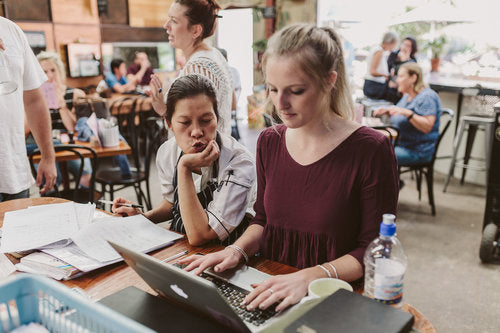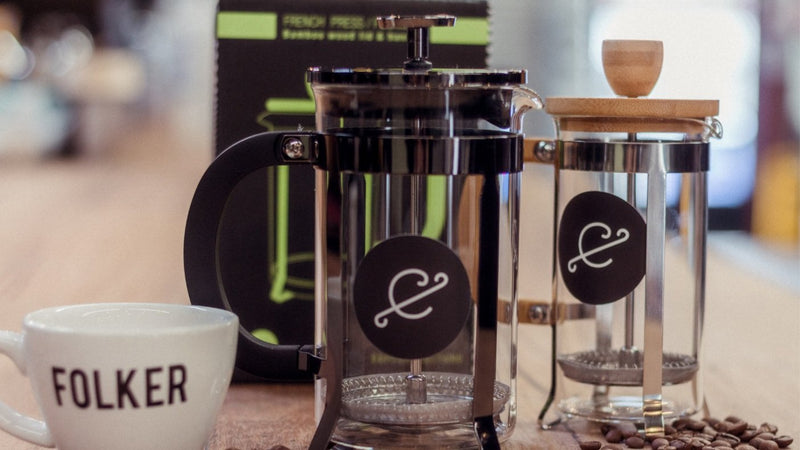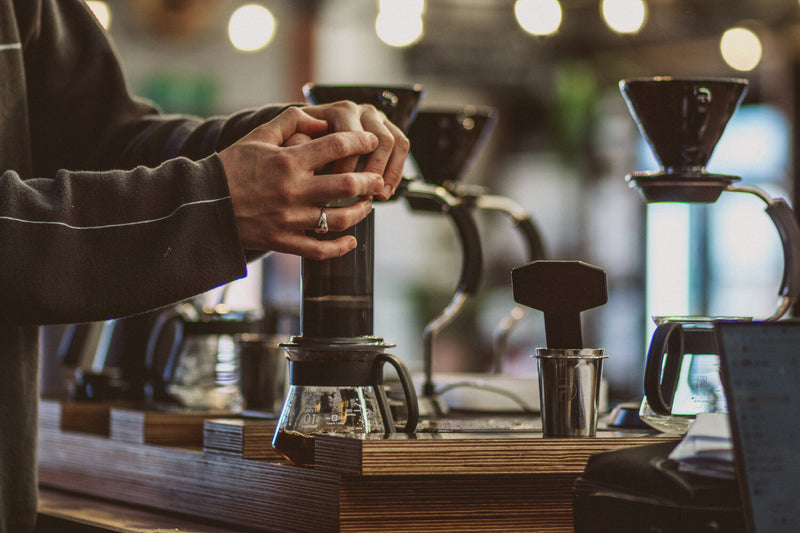Download a digital version of our full report here.
How we sourced our coffee
We are committed to our concept of partnership coffee. An idea rooted in the belief that high-quality coffee will only remain sustainable through long-term, mutually beneficial collaboration between roaster and producer. Partnerships that are more than just commercial agreements—they are founded on a collective vision for the future of coffee.
In the 2023/24 financial year 95.35% of the coffee roasted at Commonfolk Coffee Company was sourced from our long-term partnerships.
That’s up from 92% the previous year. This increase highlights our dedication to building enduring and sustainable connections with our coffee producers. For our partners, it provides more than just financial stability. It creates opportunities for growth and development, shares the risks associated with coffee production, and offers the resources needed to reinvest in their businesses and still generate profit.
How we paid for our coffee
At Commonfolk Coffee Company, we are committed to being transparent about how we pay for our coffee. However, the price of coffee varies widely across different regions due to a variety of factors. Each coffee-producing country faces its own unique challenges, including differences in production costs, economic conditions, and farming practices. These complexities make it difficult to apply a single standard for what constitutes a fair price.
Let’s take a closer look
Since 2013, we have partnered with Bom Jesus, a large estate in Brazil that manages every aspect of coffee production, from cultivation and harvesting to processing and export. This complete control over the supply chain ensures that the value created stays within the community and directly benefits the producer. This approach allows Bom Jesus to remain profitable while producing coffee that is both high quality but also cost-effective. As a result, they have been able to offer the most cost-efficient coffee in our program, which is still priced at least 20% above the highest commodity price. They also happened to produce our most expensive coffee in 2024, Premio, which we purchased for $65 per kilogram!
In contrast
In Uganda, our partnership is with Zukuka Bora, a coffee producer that collaborates closely with smallholder farmers, providing them with support and organisation as they cultivate and harvest their coffee. These farmers sell their coffee cherries directly to Zukuka Bora on the day of harvest and receive immediate payment. Last year this averaged 3,000 UGX (approximately $1.20 AUD) per kilogram of cherry. This equates to approximately $7 per kilogram for the final raw product, ensuring that the most vulnerable stakeholders in the value chain—the farmers—receive immediate compensation when they need it most. Meanwhile, Zukuka Bora adds value through their processing, milling and export, and the final price we pay reflects the additional costs involved in this method of production.
But what did we pay?
While we don’t publish a detailed breakdown of every coffee purchase, it’s not because we’re uncomfortable sharing it. Some of our producers and importers prefer we avoid publicising exact commercial terms online, as doing so could inadvertently impact their ability to negotiate beneficial terms with other buyers. Factors such as commitment to long-term contracts, the volume of the purchase, and supplier relationships play a significant role in shaping pricing dynamics, and sharing specifics could unintentionally disadvantage our partners.
That said, we’re transparent about our pricing practices and frequently discuss them openly with our retail, wholesale, and café customers. You can even get a sense of what we pay by how we price our retail coffee — all our coffees are priced against a fixed ratio. If a coffee costs more, we charge more, reflecting its value and the higher investment required to produce it. We’re also more than willing to talk about the per-kilo price we pay, the price farmers receive, or what was paid FOB (free on board) during an in-person conversation.
We believe that every cup of Commonfolk coffee should reflect the true value of the work that goes into producing it, ensuring that all participants in the value chain can prosper. Whether from a large estate in Brazil or a network of smallholders in Uganda, our pricing strategy is designed to meet the diverse needs of each context. We work closely with our partners to set prices that not only cover their production costs but also allow them to make a profit, reinvest in their businesses, improve quality, and enhance the lives of their families and communities. This is our commitment to our partners and our customers: to keep advocating for a coffee industry that prioritises people over profits and quality over quantity.
If you’re curious about our sourcing practices or want to dig deeper into the numbers, let’s chat over a cup of coffee. Transparency is important to us, and we’re always happy to share the story behind the cup in your hands.
We built in impact
We donate 20 cents to the charity, The Cup That Counts for every cup of coffee we brew and every kilo we roast. This means that simply by choosing Commonfolk, you’re actively supporting a fairer and more sustainable coffee industry—one that benefits everyone involved, from origin to outcome.
As of July 2024, we’ve raised an incredible $434,135 for The Cup That Counts. These funds have been channelled into projects that drive real change in the coffee community. Our contributions support initiatives like:
- Zukuka Bora: Empowering over 1,200 smallholder farmers and their communities in Uganda by providing essential infrastructure, training, and access to markets that offer fair prices for their coffee. This initiative helps farmers improve their livelihoods while ensuring the sustainability of their businesses.
- HomeGround: Tackling youth unemployment through a social enterprise model that offers vocational training and job opportunities in the local hospitality sector. By equipping young people with valuable skills and experience, HomeGround is creating meaningful career pathways and strengthening the community.
- Climate Resilience: Investing in projects that enable coffee farmers to adapt to the challenges posed by climate change. These initiatives focus on sustainable practices and innovative solutions that help farmers protect their crops and secure the future of the coffee industry.
By supporting Commonfolk, you’re not just enjoying great coffee—you’re contributing to a system that values fairness, sustainability, and community development. Find out more www.thecupthatcounts.org
We tread softly
Sustainability is at the heart of everything we do. In 2023/24, we made significant strides to reduce our environmental impact and operate more responsibly.
We introduced new packaging for our coffee that is kerbside recyclable, ensuring that our packaging leaves no harmful trace on the environment. This is a step forward in reducing waste and promoting sustainable consumption. We committed to eliminating single-use plastics from our operations, reducing our plastic footprint to protect our oceans and ecosystems. This move reflects our dedication to minimising waste and promoting a healthier planet.
At our Mornington headquarters, we generated 45% of our electricity needs through solar energy. This not only reduces our reliance on non-renewable energy sources but also moves us closer to our goal of being fully powered by clean, renewable energy.
For the first time ever, we achieved carbon neutrality across our entire operation by measuring, reducing and offsetting our footprint in partnership with Workiva Carbon, formerly Sustain.Life. Carbon credits will be purchased through the internationally recognised Plan Vivo scheme, specifically Trees for Global Benefit (TFGB) program in Uganda to deliver co-benefits back to the same farmers we source coffee from. While this is an important milestone, we recognise that it's only the beginning. Using data from this year, we plan to strategically reduce our emissions at the source in the future, focusing on sustainable growth and impact reduction.
We support the World Coffee Research program, which invests in innovative projects to improve coffee quality and resilience. By funding research into sustainable farming practices, we help farmers combat challenges like climate change and disease, ensuring the future of coffee for generations to come.
That's a wrap!
As we look back on 2024, one thing is clear: the journey to create a fairer, more sustainable coffee industry is not only making a difference—it’s making coffee better. By investing in long-term partnerships with producers, we’re helping farmers improve their practices, reinvest in their communities, and innovate in ways that elevate the quality of their coffee. These efforts are already paying off in the cup, delivering more delicious, complex, and exciting coffees to you.
From Zukuka Bora’s game-changing work with smallholders in Uganda to Bom Jesus’ complete control of their supply chain in Brazil, the idea is simple: treat producers fairly, give them the stability they deserve, and they’ll deliver something incredible. Better coffee doesn’t just happen; it’s built on trust, commitment, and a lot of hard work.
And here’s the thing: none of this happens without you. Every time you grab a coffee from Commonfolk, you’re part of this journey. You’re helping to create a coffee industry that’s more sustainable, more equitable, and way more delicious.
As we gear up for 2025, we can’t wait to keep sharing this ride with you. Every cup you enjoy is proof that we’re onto something good—together. Thanks for being part of the story.
 Cart
Cart



